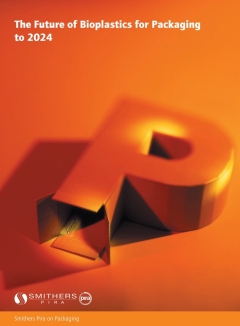
Smithers Pira forecasts global bioplastic packaging market to reach $8.8 billion by 2024
July 20, 2019The plastics industry is a major contributor to the global economy, providing foundational technologies and materials for all key segments. With a new emphasis on sustainability from leading packaging converters and food and beverage brands there is an increased demand and opportunities for bioplastics.
Smithers Pira’s latest
market report, The Future of Bioplastics for Packaging to 2024 shows that the bioplastic
for packaging applications will grow at an average annual rate of 16.2%,with
market value more than doubling from $4.4 billion in 2019 to $8.8 billion in
2024, growing at an average annual rate of 15.0%. Bioplastics are rather recent
additions to the portfolio of polymers available to manufacturers and users of
packaging systems. Bioplastics’ share of plastics packaging markets is thus
relatively modest, although forecast growth rates are very attractive.
With demand for these new materials within the global packaging markets, with
all regions forecast to see double digit growth across the five years to 2024,
The Future of Bioplastics for Packaging to 2024 identifies the following key
trends driving the biopolymer industry today:
Plastics recycling – The state of the plastics recycling business environment
will have a profound impact upon the incentives and urgency for developing
biopolymers solutions to plastics-related environmental problems.
Polymers from natural raw materials – Naturally occurring polymers, such as
starch and cellulose, will see significant extra demand for use in degradable
plastics packaging applications.
Biodegradable aliphatic-aromatic polyester polymers – Aliphatic-aromatic
polyester polymers use in packaging will grow. Demand will rise generally and
in particular be supported by moves to outlaw oxo-biodegradable plastics, such
as the EU’s proposal of May 2019.
A key challenge will be boosting heat resistance, barrier performance, and
tensile strength to allow these to directly replace the current suite of oil
based plastics, such as PET.
Polymers synthesized by microorganisms – Polyhydroxyalkanoates (PHAs) use in
packaging will also growth. There is keen interest and activity to perfect and
commercialise PHA production- and applications-related technologies.